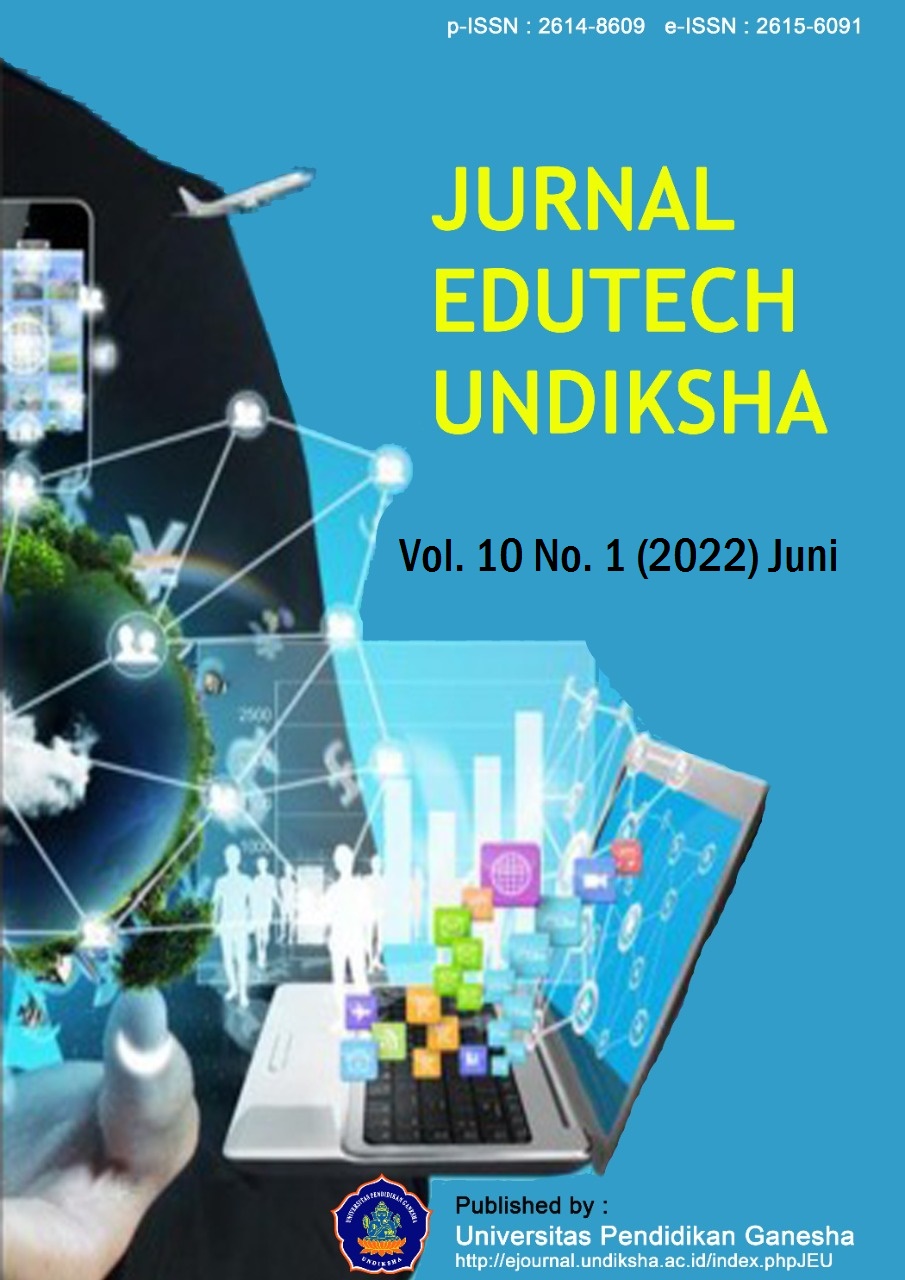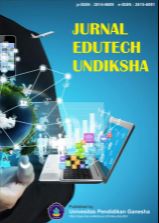Game Based Learning dan Dampaknya terhadap Peningkatan Minat Belajar dan Pemahaman Konsep Siswa dalam Pembelajaran Sains di Sekolah Dasar
DOI:
https://doi.org/10.23887/jeu.v10i1.48925Keywords:
game based learning, minat belajar, pemahaman konsep, sainsAbstract
Kegiatan belajar yang biasanya dilakukan oleh guru masih bersifat monoton dan cenderung hanya menggunakan model pembelajaran konvensional. Selain itu, kurangnya media digital menjadi kendala dalam pembelajaran daring. Tujuan penelitian ini yaitu menganalisis game based learning dan dampaknya terhadap peningkatan minat belajar dan pemahaman konsep siswa dalam pembelajaran sains di sekolah dasar. Rancangan penelitian yang digunakan adalah non equivalent post-test only control group design. Populasi dalam penelitian ini adalah siswa kelas IV SD di Gugus IV Kecamatan Sukasada yang berjumlah 95 siswa. Sampel diambil dengan teknik random sampling dengan jumlah 50 siswa. Metode pengumpulan data menggunakan observasi, wawancara, dan tes. Instrumen yang digunakan yaitu kuesioner dan lembar tes. Data yang telah dikumpulkan dianalisis dengan uji manova (multivariate analysis of varians). Berdasarkan hasil pengujian hipotesis dapat disimpulkan bahwa terdapat perbedaan minat belajar dan pemahaman konsep siswa antara kelompok siswa yang menerapkan game based learning dan kelompok siswa yang mengikuti pembelajaran secara konvensional. Disimpulkan bahwa penerapan game-based learning dapat meningkatkan minat belajar dan pemahaman konsep siswa.
References
Absari, N., Priyanto, P., & Muslikhin, M. (2020). The Effectiveness of Technology, Pedagogy and Content Knowledge (TPACK) in Learning. Jurnal Pendidikan Teknologi Dan Kejuruan, 26(1), 43–51. https://doi.org/10.21831/jptk.v26i1.24012.
Afni, N., Agung, M., Fitk, R., Sunan, U., & Yogyakarta, K. (2018). Literasi Sains Peserta Didik Kelas V di MIN Tanuraksan Kebumen. Al-Bidayah : Jurnal Pendidikan Dasar Islam, 10(1), 47–68. https://doi.org/10.14421/AL-BIDAYAH.V10I1.129.
Agustina, L. (2015). Pengaruh Penggunaan Media Visual dan Minat Belajar Siswa terhadap Hasil Belajar Matematika. Formatif: Jurnal Ilmiah Pendidikan MIPA, 1(3), 236–246. https://doi.org/10.30998/formatif.v1i3.74.
Aiman, U., Amelia, R., & Ahmad, R. (2020). Model Pembelajaran Berbasis Masalah (PBL) terhadap Literasi Sains Siswa Kelas V Sekolah Dasar. Jurnal Pendidikan Dasar Flobamorata, 1(1), 1–5. https://doi.org/10.51494/jpdf.v1i1.195.
Aini, Q., Rahardja, U., Tangkaw, M. R., Santoso, N. P. L., & Khoirunisa, A. (2020). Embedding a Blockchain Technology Pattern into The QR Code for an Authentication Certificate. Jurnal Online Informatika, 5(2). https://doi.org/10.15575/join.v5i2.583.
Alit, K., Adnyani, D., Wibawa, I. M. C., & Margunayasa, I. G. (2021). Alternative Energy Sources on Digital Comic Media. International Journal of Elementary Education, 5(1), 61–70. https://doi.org/10.23887/ijee.v5i1.34333.
All, A., Castellar, E. N. P., & Looy, J. Van. (2021). Digital Game-Based Learning Effectiveness Assessment: Reflections on Study Design. Computers & Education, 167. https://doi.org/10.1016/j.compedu.2021.104160.
Andrew, Henry, Yudhisthira, Arifin, & Permai. (2019). Analyzing the Factors that Influence Learning Experience through Game Based Learning using Visual Novel Game for Learning Pancasila. Procedia Computer Science, 157. https://doi.org/10.1016/j.procs.2019.08.177.
Anggreni, Jayanta, & Mahadewi. (2021). Multimedia Interaktif Berorientasi Model Problem Based Learning (PBL) pada Muatan IPA. Jurnal Mimbar Ilmu, 26(2). https://doi.org/10.23887/mi.v26i2.35715.
Aufa, M. N., Rusmansyah, R., Hasbie, M., Jaidie, A., & Yunita, A. (2021). The Effect of Using e-module Model Problem Based Learning (PBL) Based on Wetland Environment on Critical Thinking Skills and Environmental Care Attitudes. Jurnal Penelitian Pendidikan IPA, 7(3), 401–407. https://doi.org/10.29303/jppipa.v7i3.732.
Awe, E. Y., & Benge, K. (2017). Hubungan Antara Minat dan Motivasi Belajar dengan Hasil Belajar IPA pada Siswa SD. Journal of Education Technology, 1(4), 231. https://doi.org/10.23887/jet.v1i4.12859.
Bakri, F., Siahaan, B. Z., & Permana, A. H. (2016). Rancangan Website Pembelajaran Terintegrasi dengan Modul Digital Fisika Menggunakan 3D PageFlip Professional. Jurnal Penelitian & Pengembangan Pendidikan Fisika, 2(2), 113–118. https://doi.org/10.21009/1.02215.
Budiarto, M. K., Joebagio, H., & Sudiyanto, S. (2020). Student’s View of Using Digital Learning Media in Classroom Activities: A Case of Public Senior High School in Cirebon, Indonesia. Jurnal Pendidikan Progresif, 10(1). https://doi.org/10.23960/jpp.v10.i1.202006.
Chassiakos, Y. R., Radesky, J., Christakis, D., Moreno, M. A., Cross, C., Hill, D., Ameenuddin, N., Hutchinson, J., Boyd, R., Mendelson, R., Smith, J., & Swanson, W. S. (2016). Children and Adolescents and Digital Media. Pediatrics, 138(5). https://doi.org/10.1542/peds.2016-2593.
Chen, C.-H., & Tsai, C.-C. (2021). In-Service Teachers’ Conceptions of Mobile Technology-Integrated Instruction: Tendency towards Student-Centered Learning. Computers & Education, 170(1). https://doi.org/10.1016/j.compedu.2021.104224.
Chen, Y.-L., & Hsu, C.-C. (2020). Self-Regulated Mobile Game-Based English Learning in A Virtual Reality Environment. Computers & Education, 154. https://doi.org/10.1016/j.compedu.2020.103910.
Chick, R. C., Clifton, G. T., Peace, K. M., Propper, B. W., Hale, D. F., Alseidi, A. A., & Vreeland, T. J. (2020). Using Technology to Maintain the Education of Residents During the COVID-19 Pandemic. Journal of Surgical Education, 77(4), 729–732. https://doi.org/10.1016/j.jsurg.2020.03.018.
Citrohn, B., & Svensson, M. (2020). Technology Teacher’s Perceptions of Model Functions in Technology Education. International Journal of Technology and Design Education, 0123456789. https://doi.org/10.1007/s10798-020-09632-8.
Dewi, I. G. A. A. S. S., Sudatha, I. G. W., & Sukmana, A. I. W. I. Y. (2019). Pengembangan Multimedia Pembelajaran Interaktif Berorientasi Pendidikan Karakter Mata Pelajaran Bahasa Bali. Journal of Education Technology, 3(3), 190. https://doi.org/10.23887/jet.v3i3.21745.
Gogahu, D. G. S., & Prasetyo, T. (2020). Pengembangan Media Pembelajaran Berbasis E-Bookstory untuk Meningkatkan Literasi Membaca Siswa Sekolah Dasar. Jurnal Basicedu, 4(4), 1004–1015. https://doi.org/10.31004/basicedu.v4i4.493.
Harjanta, A. T. J., & Herlambang, B. A. (2018). Rancang Bangun Game Edukasi Pemilihan Gubernur Jateng Berbasis Android dengan Model ADDIE. Jurnal Transformatika, 16(1), 91–97. https://doi.org/10.26623/transformatika.v16i1.894.
Herliana, S., & Anugraheni, I. (2020). Pengembangan Media Pembelajaran Kereta Membaca Berbasis Kontekstual Learning Siswa Sekolah Dasar. Jurnal Basicedu, 4(2), 314–326. https://doi.org/10.31004/basicedu.v4i2.346.
Hung, C.-M., Huang, I., & Hwang, G.-J. (2014). Effects of Digital Game-Based Learning on Students’ Self-Efficacy, Motivation, Anxiety, and Achievements in Learning Mathematics. Journal of Computers in Education, 1(2–3), 151–166. https://doi.org/10.1007/s40692-014-0008-8.
Ibam, E., Adekunle, T., & Agbonifo, O. (2018). A Moral Education Learning System Based on the Snakes and Ladders Game. EAI Endorsed Transactions on E-Learning, 5(17), 1–9. https://doi.org/10.4108/eai.25-9-2018.155641.
Kao, C.-W. (2020). The Effect of A Digital Game-Based Learning Task on The Acquisition of The English Article System. System, 95. https://doi.org/10.1016/j.system.2020.102373.
Khairunnisa, G. F., & Ilmi, Y. I. N. (2020). Media Pembelajaran Matematika Konkret Versus Digital: Systematic Literature Review di Era Revolusi Industri 4.0. Jurnal Tadris Matematika, 3(2). https://doi.org/10.21274/jtm.2020.3.2.131-140.
Krath, J., Schürmann, L., & Korflesch, H. F. O. von. (2021). Revealing the Theoretical Basis of Gamification: A Systematic Review and Analysis of Theory in Research on Gamification, Serious Games and Game-Based Learning. Computers in Human Behavior, 125. https://doi.org/10.1016/j.chb.2021.106963.
Kurniawati, U., & Koeswanti, H. D. (2021). Pengembangan Media Pembelajaran Kodig untuk Meningkatkan Prestasi Belajar Siswa di Sekolah Dasar. Jurnal Basicedu, 5(2), 1046–1052. https://doi.org/10.31004/basicedu.v5i2.843.
Malamed, C. (2012). Book Review: “The Gamification of Learning and Instruction: Game-Based Methods and Strategies for Training and Education” by Karl Kapp. ELearn, 5. https://doi.org/10.1145/2207270.2211316.
Mansur, H., & Rafiudin, R. (2020). Pengembangan Media Pembelajaran Infografis untuk Meningkatkan Minat Belajar Mahasiswa. Jurnal Komunikasi Pendidikan. https://doi.org/10.32585/jkp.v4i1.443.
McDougall, J., Readman, M., & Wilkinson, P. (2018). The Uses of (Digital) Literacy. Learning, Media and Technology, 43(3), 263–279. https://doi.org/10.1080/17439884.2018.1462206.
Meriyati, M., Latifah, S., Hidayah, N., Shawmi, A. N., Amrullah, M. A., & Fitriana, N. S. (2019). Snake and Ladder Game Integrated with Asmaul-Husna: Development of Learning Media. Journal of Physics: Conference Series, 1155(1). https://doi.org/10.1088/1742-6596/1155/1/012024.
Müller, F. A., & Wulf, T. (2020). Technology-Supported Management Education: A Systematic Review of Antecedents of Learning Effectiveness. International Journal of Educational Technology in Higher Education, 17(1). https://doi.org/10.1186/s41239-020-00226-x.
Mutohhari, F., Sofyan, H., & Nurtanto, M. (2021). Technological Competencies: A Study on the Acceptance of Digital Technology on Vocational Teachers in Indonesia. Proceedings of the 1st International Conference on Law, Social Science, Economics, and Education, ICLSSEE 2021, 1–11. https://doi.org/10.4108/eai.6-3-2021.2305971.
Nugraha, Y. A., Handoyo, E., & Sulistyorini, S. (2018). Traditional Game on The Social Skill of Students in The Social Science Learning of Elementary School. Journal of Primary Education, 7(2), 220–227. https://doi.org/10.15294/jpe.v7i2.23475.
Nursyam, A. (2019). Peningkatan Minat Belajar Siswa melalui Media Pembelajaran Berbasis Teknologi Informasi Increased Interest in Student Learning through Information Technology- Based Learning Media. Jurnal Penelitian Hukum Dan Pendidikan, 18(1), 811–819. https://doi.org/10.30863/ekspose.v18i1.371.
Nurtanto, M., Fawaid, M., & Sofyan, H. (2020). Problem Based Learning (PBL) in Industry 4.0: Improving Learning Quality through Character-Based Literacy Learning and Life Career Skill (LL-LCS). Journal of Physics: Conference Series, 1573(1), 0–10. https://doi.org/10.1088/1742-6596/1573/1/012006.
Oktaviani, A., Anom, K., & Lesmini, B. (2020). Pengembangan Modul Kimia Terintegrasi STEM (Science, Technology, Engineering and Mathematics) dan PBL (Problem-Based Learning). Journal of Educational Chemistry (JEC), 2(2), 64. https://doi.org/10.21580/jec.2020.2.2.6279.
Onasanya, T. O., Aladesusi, G. A., & Onasanya, S. A. (2021). Effect of Scrabble Game On Secondary School Students’ Academic Achievements in Selected English Language Concepts in Ilorin Metropolis. Indonesian Journal of Learning and Instruction, 4(2). https://doi.org/10.25134/ijli.v4i2.5200.
Partovi, T., & Razavi, M. R. (2019). The Effect of Game-Based Learning on Academic Achievement Motivation of Elementary School Students No Title. Learning and Motivation, 68. https://doi.org/10.1016/j.lmot.2019.101592.
Prahmana, R. C. I., Zulkardi, & Hartono, Y. (2012). Learning Multiplication Using Indonesian Traditional Game in Third Grade. Journal on Mathematics Education, 3(2), 1–16. https://doi.org/10.22342/jme.3.2.1931.115-132.
Rahayu, T., Mayasari, T., & Huriawati, F. (2019). Pengembangan Media Website Hybrid Learning Berbasis Kemampuan Literasi Digital dalam Pembelajaran Fisika. Jurnal Pendidikan Fisika, 7(1), 130–142. https://doi.org/10.24127/jpf.v7i1.1567.
Ristanto, R. H., Rusdi, R., Mahardika, R. D., Darmawan, E., & Ismirawati, N. (2020). Digital Flipbook Imunopedia (DFI): A Development in Immune System e-Learning Media. International Journal of Interactive Mobile Technologies (IJIM), 14(19), 140–162. https://doi.org/10.3991/ijim.v14i19.16795.
Rofiq, A., Mahadewi, L. P. P., & Parmiti, D. P. (2019). Pengembangan Multimedia Pembelajaran Interaktif pada Mata Pelajaran IPS Terpadu. Journal of Education Technology, 3(3), 126. https://doi.org/10.23887/jet.v3i3.21732.
Sanosi, A. B. (2018). The Effect of Quizlet on Vocabulary Acquisition. Asian Journal of Education and E-Learning, 6(4), 4–11. https://doi.org/10.24203/ajeel.v6i4.5446.
Santi, E. A., Gorghiu, G., & Pribeanu, C. (2020). Teachers’ Perceived Self-Efficacy Concerning the Use of Mobile Technology in Education, Considering the “Working from Home” Format. Revista Romaneasca Pentru Educatie Multidimensionala, 12(1Sup2), 157–166. https://doi.org/10.18662/rrem/12.1sup2/259.
Sargeant, B. (2015). What is An Ebook? What is a Book App? And Why Should We Care? An Analysis of Contemporary Digital Picture Books. Children’s Literature in Education, 46(4), 454–466. https://doi.org/10.1007/s10583-015-9243-5.
Sari, F. K., Rakimahwati, R., & Fitria, Y. (2019). Hubungan Minat dan Hasil Belajar Peserta Didik pada Pelajaran Matematika Kelas VI SDN 25 Jati Tanah Tinggi. Journal of Elementary Education, 3(2). https://doi.org/10.31004/basicedu.v3i2.18.
Sari, P. A. P. (2020). Hubungan Literasi Baca Tulis dan Minat Membaca Dengan Hasil Belajar Bahasa Indonesia. Journal for Lesson and Learning Studies, 3(1), 141–152.
Setiyani, Putri, D. P., Ferdianto, F., & Fauji, S. H. (2020). Designing a Digital Teaching Module Based on Mathematical Communication in Relation and Function. Journal on Mathematics Education, 11(2), 223–236. https://doi.org/10.22342/jme.11.2.7320.223-236.
Shatri, Z. G. (2020). Advantages and Disadvantages of Using Information Technology in Learning Process of Students. Journal of Turkish Science Education, 17(3). https://doi.org/10.36681/used.2020.36.
Sidiq, D. A. N., Fakhriyah, F., & Masfuah, S. (2020). Hubungan Minat Belajar IPA Siswa Kelas V SD Negeri 2 Pelemkerep terhadap Hasil Belajar Selama pembelajaran Daring. Progres Pendidikan, 1(3), 243–250. https://doi.org/10.29303/prospek.v1i3.31.
Siswono, H. (2017). Analisis Pengaruh Keterampilan Proses Sains terhadap Penguasaan Konsep Fisika Siswa. Momentum: Physics Education Journal. https://doi.org/10.21067/mpej.v1i2.1967.
Soetan, A. K., Alaka, & Onojah, A. A. (2021). Attitude of Hearing-Impaired Students towards Assistive Technology Utilization in Oyo State Adopting the Survey Method. Indonesian Journal of Community and Special Needs Education, 1(2). https://doi.org/10.17509/ijcsne.v1i2.36963.
Sri Cahya Dewi, N. K., & Suyanta, I. W. (2019). Pembelajaran Seni dan Teknologi Digital sebagai Media Belajar dan Perkembangan Anak Usia Dini. Pratama Widya : Jurnal Pendidikan Anak Usia Dini, 3(1), 112–119. https://doi.org/10.25078/pw.v3i1.710.
Su, C.-H., & Cheng, C.-H. (2013). A Mobile Game-based Insect Learning System for Improving the Learning Achievements. Procedia - Social and Behavioral Sciences, 103. https://doi.org/10.1016/j.sbspro.2013.10.305.
Sukendro, S., Habibi, A., Khaeruddin, K., Indrayana, B., Syahruddin, S., Makadada, F. A., & Hakim, H. (2020). Using an Extended Technology Acceptance Model to Understand Students’ use of E-Learning during Covid-19: Indonesian Sport Science Education Context. Heliyon, 6(11), e05410. https://doi.org/10.1016/j.heliyon.2020.e05410.
Suryaningsih, N. M. A., & Rimpiati, N. L. (2018). Implementation of Game-Based Thematic Science Approach in Developing Early Childhood Cognitive Capabilities. Jurnal Obsesi : Jurnal Pendidikan Anak Usia Dini, 2(2), 194–201. https://doi.org/10.31004/obsesi.v2i2.90.
Tambunan, L. R., & Sundari, E. (2020). Pengembangan Buku Digital pada Materi Persamaan Garis Singgung Lingkaran. AKSIOMA: Jurnal Program Studi Pendidikan Matematika, 9(4), 1184. https://doi.org/10.24127/ajpm.v9i4.3084.
Taqiyyah, S. A., Subali, B., & Handayani, L. (2017). Implementasi Bahan Ajar Sains Berbahasa Inggris Berbasis Metakognitif untuk Meningkatkan Kemampuan Pemecahan Masalah Siswa SMP. Jurnal Inovasi Pendidikan IPA, 3(2), 224–234. https://doi.org/10.21831/jipi.v3i2.14859.
Teräs, M., Suoranta, J., Teräs, H., & Curcher, M. (2020). Post-Covid-19 Education and Education Technology ‘Solutionism’: a Seller’s Market. Postdigital Science and Education, 2(3), 863–878. https://doi.org/10.1007/s42438-020-00164-x.
Trisniawati, Rahayu, A., & Rhosyida, N. (2018). Implementasi Pembelajaran Origamasains Matematika dan Sains Sejak Dini the Implementation of Origamasains Learning to Emerge Fondness to Mathematics and Science. Jurnal Ilmiah VISI PGTK PAUD Dan Dikmas, 13(2), 91–99. https://doi.org/10.21009/JIV.1302.3.
Troussas, C., Krouska, A., & Sgouropoulou, C. (2020). Collaboration and Fuzzy-Modeled Personalization for Mobile Game-Based Learning in Higher Education. Computers & Education, 144. https://doi.org/10.1016/j.compedu.2019.103698.
Wardani, S., Lindawati, L., & Kusuma, S. B. W. (2017). The Development of Inquiry by Using Android-System-Based Chemistry Board Game to Improve Learning Outcome and Critical Thinking Ability. Jurnal Pendidikan IPA Indonesia, 6(2), 196–205. https://doi.org/10.15294/jpii.v6i2.8360.
Widiana, I. W., Jampel, I. N., & Prawini, I. G. A. P. (2018). The Effectiveness of Communication Learning Activities Based on Tradisional Game toward The Cognitive Process Dimension. Jurnal Cakrawala Pendidikan. https://doi.org/10.21831/cp.v37i2.14091.
Wulandari, I. G. A. A. M., Sudatha, I. G. W., & Simamora, A. H. (2020). Pengembangan Pembelajaran Blended pada Mata Kuliah Ahara Yoga Semester II di IHDN Denpasar. Jurnal Edutech Undiksha, 8(1), 1. https://doi.org/10.23887/jeu.v8i1.26459.
Yeh, Y. T., Hung, H. T., & Hsu, Y. J. (2017). Digital Game-Based Learning for Improving Students’ Academic Achievement, Learning Motivation, and Willingness to Communicate in An English Course. International Congress on Advanced Applied Informatics. https://doi.org/10.1109/IIAI-AAI.2017.40.
Yudhiantara, R. A., & Saehu, A. (2017). Mobile-Assisted Language Learning (MALL) in Indonesian Islamic Higher Education. IJELTAL (Indonesian Journal of English Language Teaching and Applied Linguistics), 2(1), 21–31. https://doi.org/10.21093/ijeltal.v2i1.52.
Yunitasari, R., & Hanifah, U. (2020). Pengaruh Pembelajaran Daring terhadap Minat Belajar Siswa pada Masa COVID 19. Edukatif : Jurnal Ilmu Pendidikan, 2(3), 232–243. https://doi.org/10.31004/edukatif.v2i3.142.
Zaki, N. A. A., Zain, N. Z. M., Noor, N. A. Z. M., & Hashim, H. (2020). Developing a Conceptual Model of Learning Analytics in Serious Games for Stem Education. Jurnal Pendidikan IPA Indonesia, 9(3), 330–339. https://doi.org/10.15294/jpii.v9i3.24466.
Zou, D., Huang, Y., & Xie, H. (2019). Digital Game-Based Vocabulary Learning: Where are We and Where are We Going? Computer Assisted Language Learning, 0(0), 1–27. https://doi.org/10.1080/09588221.2019.1640745.
Downloads
Published
How to Cite
Issue
Section
License
Copyright (c) 2022 I Wayan Widiana

This work is licensed under a Creative Commons Attribution-ShareAlike 4.0 International License.
Authors who publish with the Jurnal EDUTECH Undiksha agree to the following terms:
- Authors retain copyright and grant the journal the right of first publication with the work simultaneously licensed under a Creative Commons Attribution License (CC BY-SA 4.0) that allows others to share the work with an acknowledgment of the work's authorship and initial publication in this journal.
- Authors are able to enter into separate, additional contractual arrangements for the non-exclusive distribution of the journal's published version of the work (e.g., post it to an institutional repository or publish it in a book), with an acknowledgment of its initial publication in this journal.
- Authors are permitted and encouraged to post their work online (e.g., in institutional repositories or on their website) prior to and during the submission process, as it can lead to productive exchanges, as well as earlier and greater citation of published work. (See The Effect of Open Access)















